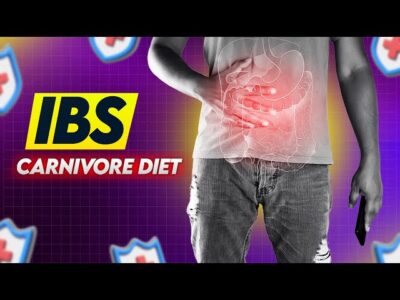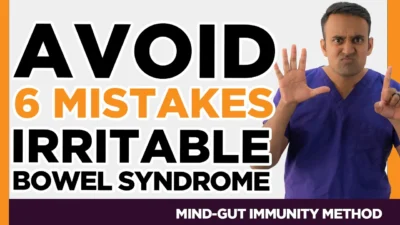For our clients, we help design custom diet plans based on several key criteria: Microbiome Specificity, Phytonutrients, Macronutrients, and Food Sensitivity. These four criteria help determine whether any type of diet will work for managing Irritable Bowel Syndrome symptoms during a flare, as well as healing inflammation over time, to reach remission.
fasting for irritable bowel syndrome does it help with IBS and can you keep it up longterm that’s what we’re going to dig into today we’ll cover water fast intermittent fasting the one meal a day approach and the pros and cons of hidden ketosis for [Music] IBS hi I’m Dr chanu doser a surgeon who specializes in r vering complex inflammation naturally using the minda immunity method we’ve refined our methodology over the past 12 years and have helped thousands of patients recover we look at conditions such as IBS and solve the root cause and as you know by now from the hundreds of research papers on the topic the gut microbiome plays a significant role in modulating the immune response seen in IBS if you want to find out how we fix these issues schedule a discovery call with me and I’ll provide you with some helpful tips on how to get started there are several studies that describe fasting in the setting of IBS here’s a 2006 study on the effects of fasting therapy on irritable bowel syndrome now I’m going to break down this study that explores fasting in the context of IBS but I’ll also throw some personal insights into how fasting plays out over time for people with this condition first things first did you know that 80% of your immune system is in your gut it’s called the mucosa Associated lymphatic tissue or Mt for short this Mt is packed with trillions of immune cells that React to what whatever is hanging out in your intestines and what’s in your intestines mostly food and a bunch of microbes like bacteria fungi and viruses these organisms help digest food and create all sorts of metabolites which can sometimes trigger an immune response and that’s why it’s so important to not only eat the right kind of food but also maintain a healthy microbiome to keep things running smoothly take a look at my other video titled ideal diet for IBS I’ll drop a link in the description below and in that video I go over the four criteria I use to figure out if a Diet Works or not for irritable bowel syndrome spoil alert I’m a big fan of the phytonutrient diet or phyto Diet we use it all the time in the clinic and get great results for our patients combine that with a Precision microbiome recalibration and we usually see symptoms improve fast often within just weeks so be sure to check out the video if you want to understand more about why phytonutrients are such a big deal in your diet now let’s break down the four criteria I use to evaluate in diet you have phytonutrient density and diversity you have macro requirements microbiome specificity and lastly food sensitivity if you’re wondering why these matter no worries I’ve got you covered in the ideal diet for IBS video it’s linked in the description below but I’ll quickly give you a rundown of these so that you don’t have to bounce back to these videos phytonutrient density and diversity phytonutrients are powerful micronutrients that play a crucial role in reducing inflammation in the body there’s a wealth of research highlighting The crucial role that phytonutrients play in managing and healing IBS here’s a 2023 study on the effects of polyphenols and minerals and fiber on IBS another 2021 study explored gastr protective effects of polyphenols against inflammatory conditions in the bowel and here’s one from 2022 discussing Prebiotic fiber and its efficacy in treating IBS symptoms phytonutrients are molecular compounds found primarily in plants and fungi they have a significant positive impact on human health these include well-known terms like superfoods micronutrients and antioxidants research consistently shows that supplementing your diet with phytonutrients can help alleviate irritable bowel syndrome symptoms and phytonutrients can be broken down into several categories chirpin phenols chlorophyll thiocyanates phyto enzymes phyto oils prebiotics and alkaloids while there are other smaller groups such as betal Lanes from beets and herisson from mushrooms focusing on these eight categories will cover most of your phytonutrient needs deficiencies in these essential nutrients can disrupt The crucial mind immune system connection and make it harder to manage conditions like IBS the goal is always to maximize and optimize phytonutrient intake in your everyday foods and by maximize and optimize I mean increasing both the density and diversity of phytonutrients in your diet and this is critical for maintaining health and reversing IBS symptoms a diet low in phytonutrients can make it more difficult to overcome inflammatory responses associated with IBS so when it comes to fasting we often aren’t getting enough phytonutrients from our diet or in some cases we’re getting very little what typically happens is that you may feel better temporarily when there’s no food in your system less food means less to digest and your intestines are more at rest however the absence of phytonutrients during fasting means that immune regulation isn’t happening as it should be and as a result once you stop fasting the symptoms tend to return one suggestion I have if you’re considering a water fast or several days or even intermittent fasting with a six or 8 Hour window try adding some herbal teas to your routine herbal teas are an excellent source of phytonutrients like polyphenols and Turpin which can help manage inflammation without adding any additional calories next macro requirements macro stands for macronutrients which are carbs fats and proteins essential components your body needs to function properly there’s a helpful tool on my website called the macro calculator which you can figure out your own body’s maintenance needs based Bas on your height weight age gender and activity level now it’s important to remember that these macronutrient estimates are based on ideal physiological conditions but when you’re fasting whether it’s longterm or short-term you won’t get these nutrients or you’ll get them in reduced amounts and this brings us to the different types of fasting which includes water fasts which are 24 48 or 72 hours or even 5 to 14 days even you can have total caloric restriction which means consuming less than 800 to 1,000 calories a day not on any particular schedule you can have intermittent fasting eating on a 6h hour 8 hour 10 hour or 12 hour window and one meal a day or omad consuming all of your calories in just a single meal whichever fasting method you choose for addressing IBS the underlying benefit comes from ketosis ketosis is a state in which your body stops relying on carbohydrates for energy and instead uses stored fat and muscle and many proponents of fasting highlight a process called autoph where the body cleans up old and damaged cells which can naturally reduce inflammation but here’s the issue while fasting strategies might temporarily alleviate symptoms they almost always come back so what happens the second or third or longterm when you are using fasting as a tool to manage IBS when symptoms return eating can become even more challenging you might feel bloated gassy fatigue low on energy after meals sound familiar these symptoms can discourage you from eating properly in the future leading to a vicious cycle that’s hard to break especially if you’re underweight a body mass index BMI of 18 or lower can be particularly concerning for people with IBS you can easily calculate your BMI using the BMI calculator on our Clinic’s website by entering your height and weight if your BMI is below 18 and you have IBS you’re at a higher risk for complications and I’ve seen patients with bmis as low as 13 which can be quite severe when someone with IBS has low BMI ey it means their body is in a catabolic State breaking down muscle instead of building it up which can be detrimental to intestinal healing often these patients struggle to tolerate food and require careful coaching to reintroduce it later into their diet the reason I stress this is because the solution to a dysfunctional gut microbiome should never be to avoid food or stop eating even if fasting makes you feel better temporarily and trust me I used to fast myself so I understand the short-term relief but instead of avoiding food the focus needs to be on reducing inflammation first and then return to normal eating habits when you start doing this and when my patients started doing this it allowed for Real Recovery unfortunately many people with IBS have given up on finding the ideal diet and may end up avoiding food altogether here’s a recent study showing that intermittent fasting over long periods of time actually increases the risk of cardiac death furthermore if you have caloric restriction for long periods of time and we’re talking over several days weeks months of intermittent fasting various issues can arise you’ll have weight loss and muscle wasting thyroid dysfunction is quite common in these cases cortisol and sympathetic endocrine dysfunction you can have sleep disturbances you have protein calorie malnutrition which impedes wound healing and inflammation control you can have nausea reflux and a feeling of fullness and decreased appetite and of course severe intermittent fatigue the reason I emphasize that the solution to a dysfunctional gut microbiome should never be to stop eating or avoiding food altogether instead the focus should be on reducing inflammation first and then returning to a normal balanced diet unfortunately many people with IBS have struggled to find the right diet and may end up avoiding food altogether which only worsens the issue if you’re trying to figure out the ideal macronutrient balance for managing IBS you need to focus on fats carbs and proteins to reduce inflammation I recommend that roughly 50% of your daily calories come from fats while carbohydrates and proteins each make up about 25% the reason carbohydrates should make up a smaller portion of your diet especially in the beginning is because gut bacteria and particularly harmful microbes like candida thrive on sugar they love carbs and if your microbiome is already imbalanced feeding it sugar can only make it worse so you have bad bacteria and fungus and you give it sugars carbs and fiber and what do you get inflammation simple sugars like glucose and fructose can stimulate the growth of both harmful bacteria and Fung similarly simple starches such as those found in processed flour can lead to bacterial and fungal overgrowth this observation is based on my extensive experience working with thousands of patients rather than any specific scientific studies if your goal is to lose weight you might want to reduce both your carbs and fats even further while increasing proteins and cutting overall calories on the other hand if you’re trying to gain weight you want to increase your total caloric intake and adjust your carbs and fat ratios to find a more balanced approach try tracking these macronutrients can help you reach your desired health goals in the case of IBS while it requires some effort it’s worth it and this approach can dramatically improve your diet and decrease irritable bowel so just to recap the criteria I use to judge whether a diet will work for reversing the inflammation longterm in patients with IBS are the following phytonutrient focused meeting nutritional requirements microbiome specificity and avoiding food sensitivity and as I mentioned earlier feel free to check out some of my other videos or refer to the description below for additional resources I’ve included a link to a body mass calculator on my website as well as a link to the various types of phytonutrients needed to support recovery from irritable bowel syndrome you’ll also find a macronutrient calculator that helps you determine your daily carbs fats and protein needs and a fiber and starch guide to help you avoid the types of carbohydrates that can worsen gut microbiome dysfunction as I’ve said before I work closely with my clients to help them formulate diets based on these principles and they experience significant improvements the severity of those symptoms often decrease quickly and many of them are able to get off their medications and Lead healthy lives I’m a strong advocate of the phyto diet and I use it regularly in my clients it’s a diet that works well for microbial recalibration and addressing issues related to phytonutrient deficiency it also helps avoid food sensitivities while meeting long-term nutritional needs so for those of you that are undereating this typically means you need to eat more but you’ll be eating eating the right Ka of foods that will not only help you gain healthy weight but also heal inflammation the proper way by following this approach you can avoid many of the negative consequences that come from long-term undereating in people with irritable bowel it’s true that reversing the effects of fasting can be hard work but it can be done with the right plan and the right approach okay one last thing I would love to hear your thoughts down below comment on the types of foods that exacerbate your IBS and create inflammation in your system and what have you done to avoid them and finally if you like this video please like And subscribe and be sure to share this video with someone you think it can help this is Dr chanu daser with the Mind gut immunity clinic and I’ll see you next time [Music]







